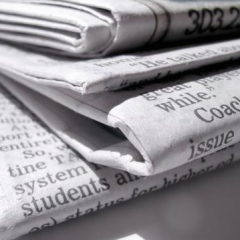Nine Questions: New England Guilds, Tribune Fallout, San Diego Vacuum and the News Industry's Most Successful Alumnus
-
-

Things are turning ugly. Globe staffers up the ante in Boston. John Carroll calls Sam Zell an idiot. Online ads on newspaper sites drop to double-digit negatives. Which leaves me, as we approach this summer of our discontent, with more questions than answers. Here's Nine:
1.
Down the road, will the Globe Guild members like their new owners better than the New York Times Company? Certainly, the Globe's sense of loss is understandable — and real. Still, it's intriguing to compare the Globe Guild's rejection of the Times' offer to the Portland Guild's recent
partnering with venture capitalists to take Maine Newspapers down a new road. The Maine Guild accepted givebacks to get the deal done, and to get a share of the company. My sense: It's always easier to be enthusiastic about the new, unknown guys than the management you've dealt with for years, even it is the New York Times.
2. Where will lenders — the new owners-to-be of bankrupt newspapers like the Tribune and the Inquirer — turn for new leadership? They've got old-time publishers to choose from — lots of them in the market — as they replace the entrepreneurs like Sam Zell and Brian Tierney who fatally entered the trade in the last several years. They've got broadcast people, borrowing a page from Zell's playbook, as inevitably newspaper and local broadcast operations do grow together. They've got their pick of ad veterans, if they smartly see that local media success is going to be dependent on inventing scalable digital businesses.
3a.
Won't Connecticut Attorney General Richard Blumenthal's okay of Tribune's merged TV/newspaper operations in Hartford seem quaint fairly soon? Sure, the FCC-related value of diverse community voices is a good idea. Going forward, though, the divide between local news video and local story/blog writing creation is an artificial one. Bottom line: The marketplace will probably take care of local news diversity rather than the increasingly outmoded rules of Old Media.
3b. Aren't we finally able to put a pricetag on Sam Zell's unwarranted optimism and hubris? It looks like his $250 million "loan" to Tribune will be wiped out in the bankruptcy, as will his $90 million warrant. Still, it's just pin money for the guy who sold his real estate investment trust for $36 billion in 2006 and knows enough — endowing the Zell Center for Risk Research at Northwestern — to make judicious bets.
4.
While the San Diego News Network (Chris Jennewein's new hangout) is hardly a commercial threat yet in San Diego, the cratering of the Union-Tribune — a one-time employer of 1422 people that will soon be paying only 572 850 — leads to this question, in San Diego and elsewhere: How big a marketplace hole does a disappearing daily leave in its wake? My guess is that with an economic recovery, we'll see lots of small-shop entrepreneurs aiming to pick up local merchant dollars now in flux.
5. Why would anyone expect the Kindle to "save" newspapers when it hardly supports advertising and takes 70% of subscription revenue?
6. Did you ever expect a newspaper company CEO to go out this way, as Freedom CEO Scott Flanders replaces Christie Hefner?; note the big smile in the photo. What sold him on the job? An earlier article suggested the company's strategy: "….after a couple of recent visits to the Playboy Mansion, Mr. Flanders has emerged as the clear favorite…"
7.
Isn't Seattle Tweets a simple, good idea any local news website should copy? The online-only PI-com picked out less than a dozen top local news providers — KOMO, KING, KIRO, West Seattle Blog, TechFlash, and more — and aggregated their news tweets. The PI asked for permission — 140-character Tweets are essentially full-text — and got it. Seattle Tweets provides a with-it quick tour of what's going on in Seattle, minute by minute.
8.
Doesn't the new Scribd Store – Scribd: "Collect all the world's written content in one place." — point another direction in selling news editions, historical and commemorative?Publishers get 80% out of this deal. While no news companies are yet involved, a major book publisher will soon break the Old Media ice here.
9. Though we hear little talk of it, won't 2010 offer a reprieve to newspaper publishers — going against 30% year-over-year revenue declines — as a recovery returns some auto, real estate and retail revenues lost to recession?
Article Tags
Categories
Related Posts




